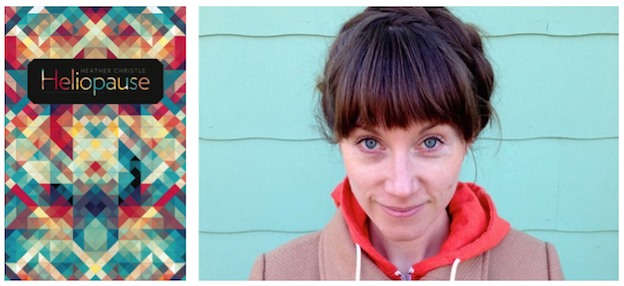A review of Heather Christle's 'Heliopause'

First of all, what is a heliopause? If etymology can be believed, it’s the caesura that lives in the sun, a respite from ordinary days and nights, a pause in life wearing a yellow dress, or maybe a green dress, maybe also embedded with jewels.
These poems by Heather Christle, in her fourth full-length collection, wear the title well, but not all of them. There are ebbs in the sun’s glint that let us in on what ants might learn from masturbation, on the poet-speaker’s friendship with a fellow poet, and on the oscillations of music and its influence on the poet-speaker, though this too could be redolent of sun (in a sense). These are not conventional narrative poems, and, as with her other books, Christle provides a sense of lyric exigency that is both humorous and necessary, leaving little excess but comprising a world that leaves readers with ways to get in.
The sections of the book diverge from one another quite a bit. These are poems of habitation, in the sense that a linguist would dwell in language, as the epigraph by W. S. Graham lets us know: “What is language using us for? / It uses us all.” The poems are very light, as the yellow or green dress attests, and Christle writes in the book’s first poem that “What’s in charge here is the scattered light all over // and how it pulls my very blood into my hands.” She immediately segues into a beautiful section called “Disintegration Loop,” a meditative piece dedicated to William Basinski, a long poem written while listening to his music. This is a poem of contradictions and loops; it is a haunting poem that reminds me of Jack Spicer or some of the cooler pieces by George Oppen or Michael Palmer. Christle uses abstract philosophical language (“beauty is what beauty does to you”) to weave a web of paratactic fragments here.
Other poems in Heliopause address someone ambiguously defined as “you.” In “Summer,” the poet-speaker says:
Today you find yourself guilty
as the rim you split
an egg against
You press charges
You spell out your name
It’s tough to know who’s being addressed, for the speaker doesn’t seem to address everyone reading but an individual. These poems are not without a sense of violence, of the Real, for in “Realistic Flowers,” Christle writes that “I was so happy I could have / torn your head apart.” I get the sense that Christle is deftly and consciously working with Lacanian themes in the smaller poems that are not addressed to anyone, and a number of them show a sunny face to the reader that is just the slightest bit menacing.
“Elegy for Neil Armstrong” makes a whole section of the book, and is very funny. Christle riffs on Frank O’Hara — “Neil, we can // see you // get / up” — and the poem is spaced across the page to read like an erasure poem. This poem stands apart (but just a little) from the sad, spacey speaker of the other Real poems, and so do some of the poems with dedications. Christle maintains a sense of disappointed hunger in many of her poems, but the haecceity in the poem to Arda Collins is a nice change: “What they are trying to tell you / is you are wearing the wrong bra / for your shape and situation.” “Dear Seth,” for Seth Landman, does the same. Here the speaker-poet leaves the sun and gets sentimental, with lines like, “You have been disappointed / in love and I am sorry.” She maintains spacey humor but includes more of the physical world: “It’s snowing again lightly in Ohio.” I think this is a welcome change and appreciate Christle’s inclusion of the sensible world and its details.
The last poem, “Poem for Bill Cassidy,” is more confessional, and seems much softer and contains more gravitas than the other poems. It opens:
Already I have confessed
the whole alphabet
under my own duress
I came back again to try
a lamentation
The poem ends the book (with its multifarious and quirky humor) on a somber tone. Yet the book ends with a thick light, as the speaker would have it. The yellow sun stays bright, and I’ll be curious to see whether Christle’s next book delves into the shadows a bit more.
